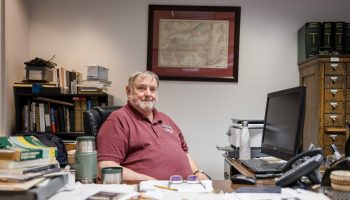
Liz DeLillo
Staff writer
The story of the Denyce Graves Foundation is an unexpected one: it was born out of conversations about Mary Cardwell Dawson and a cooking show during COVID-19.
Denyce Graves-Montgomery is speaking at 10:45 a.m. today in the Amphitheater about the Denyce Graves Foundation as part of this week’s Chautauqua Lecture Series theme “Art in Action: Building Community Through the Arts.” She will share about the foundation’s history and purpose as well as the significance of its endeavors.
“The foundation sits at the intersection of American history, of social justice and the classical vocal art,” she said. “We’re dedicated to reshaping the narrative of classical music and amplifying the stories of those artists who have been historically overlooked, and we invest in the next generation of vocal talent through education through mentorship.”
Graves-Montgomery is Chautauqua Opera Conservatory Artistic Advisor as well as an internationally acclaimed mezzo-soprano. She is a U.S. Global Music Ambassador and recently received the Service to American Leadership Award from the National Association of Broadcasters Leadership Foundation.
Graves-Montgomery shared how one of her students was performing outside of the historic home of the National Negro Opera Company, which was founded by Mary Cardwell Dawson. Learning and sharing more about Dawson’s life was an integral step in how the foundation came to be, she said.
“I was talking about this woman Mary Cardwell Dawson, and people were saying to me: Who is this woman, I don’t know anything about her, I never knew about her,” Graves said. “She’s considered to be the first lady of opera, and who knew that the first lady of opera — the first impresario in the United States — was a Black woman?”
At around the same time, Graves-Montgomery said, she started an online cooking show, which enabled her to continue a tradition with her students within the isolation produced by the COVID-19 pandemic.
“One of the things that I would do with students (was), when my students were getting ready for a recital or an audition tour or a big concert, I would have them come over to the house, have a small little audience and do sort of a Liederabend or a masterclass situation for them to run through their materials,” she said. “And then I would cook.”
The COVID-19 pandemic produced immense hardships for performing artists in particular, as opportunities to train and perform became scarce. Graves-Montgomery’s culinary practice took on a new significance in that time.
“Basically to sort of lift their spirits, I created an online version of me doing these masterclasses at home, where I would basically go into their homes, into their kitchens and speak with them while they were cooking and while I was cooking,” she said.
Graves-Montgomery would discuss Dawson with friends, colleagues, students and on “Cooking with Denyce.” Then the Washington National Opera reached out about creating an opera about Dawson, and The Passion of Mary Cardwell Dawson premiered in 2021, according to Graves-Montgomery.
“That started something, and it was about celebrating and bringing into rightful prominence these great individuals who have contributed to our cultural fabric but whom we know nothing about,” Graves-Montgomery said. “That’s how it started, it was about the celebration of these hidden figures.”
This combination of fostering community as well as shedding light on and honoring these significant people from history provided the impetus for the foundation. Its flagship program, Shared Voices, is an HBCU conservatory exchange program bringing together students, faculty and administrators from top conservatories and HBCUs.
“They have the opportunity to go into each other spaces and — with a mission — to learn and to share work from each other, and also to have in the canon pieces that are about great, underrepresented artists — whether that’s women, whether that’s LGBTQ (people), whether that’s African American men and women, whomever it might be,” she said. “… That’s the purpose, to get it on that level.”
Each program emphasizes this mission in a unique way. Beyond Shared Voices, the Hidden Voices program aims to create works of art that tell the stories of historical figures like Mary Cardwell Dawson, and the Generational Voices program works to address the vulnerability of emerging artists by providing career mentorship from current, successful artists in the field.
“They’re all modeled after the work that Mary Caldwell Dawson did, so that we don’t find ourselves right in that situation again where great people and great artists go unheard of,” she said.
The Denyce Graves Foundation has numerous initiatives working toward these goals, and Graves-Montgomery highlighted that they each share broader commitments.
“The foundation really is about bringing people together and creating a more compassionate world,” she said. “There are three different programs that we have, but it’s about creating a more compassionate world through the lens of music and in a way that people can receive it and can hear it.”
Graves-Montgomery emphasized the overlapping goals and commitments of the foundation with Chautauqua Institution, underscoring the significance to uplifting the arts in these ways.
“The Denyce Graves Foundation and Chautauqua have a shared belief that art is not a luxury, but it’s a living language of connection,” she said.




